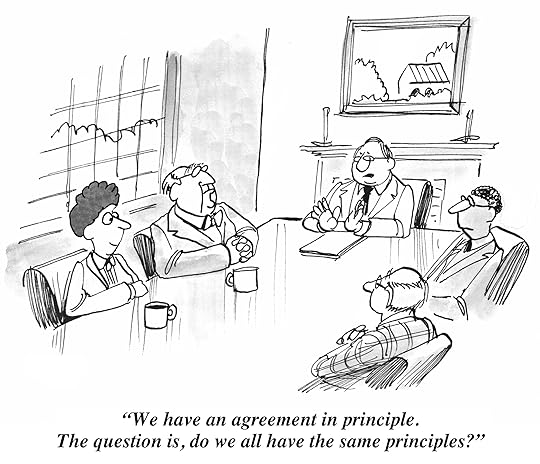Dave Anderson's Blog, page 10
February 21, 2017
A Leader’s Values
Unfortunately, many companies have values that no one can remember or understand. Even fewer companies have values that people actually live by.
Some leaders believe that just because they have a list of lofty sounding words posted somewhere, they have done something important. But, what should values do besides take up space on a company website?
What Do Values Do?
I use the term Organizational Character, instead of culture, to describe HOW a company or a team actually operates. The character of the organization is that team’s demonstrated values.
Please notice, I did not claim Organizational Character was based on a team’s declared values. The true character of an organization is based on how the people in that organization behave with the customers and with each other.
Values guide every leader and every team. Every leader and every team has values. The real values of a leader or a team is displayed by their behaviors, not by words on a webpage.
The question is “Is the Organizational Character of the team aligned with the values the leader claims they have?”
A strong and living set of values describes HOW a leader and a team will behave, no matter the circumstances.
Values provide guidance in four important ways:
What do we stand for? The time to figure out what you stand for is not in the midst of a crisis. It is up to the leadership to determine what is most important, before the team or the leader is tested in a crisis.
How do we behave? Declaring that we have values does not make them important, if they have no impact on how people behave. Leaders must use the values to define what good behaviors look like. Don’t just throw out a word like Integrity or Teamwork and expect everyone’s behaviors to automatically align.
How do we make decisions? Having a defined set of values and a clear understanding on how they impact our behaviors, gives the leader and the led clarity when making difficult decisions. When we operate without strong values, our decisions become purely pragmatic. “What’s going to work?” Pragmatism is not a bad thing unless we allow it to overcome our sense of who we are and what we stand for. If we let our values guide us in our decisions, we can find a way to make things work without compromising our individual and Organizational Character.
What can others expect from us? When we consistently operate based on a set of guiding values, other people will trust our words and our actions. We will not be settling for compliant employees or one-time customers. We will have committed teammates and long-term partners.
The Bottom Line:
Who cares what a leader says their team or their family stands for if the leader is not actively engaged in guiding that Organization’s Character. Values on a website are not enough. Claiming our families stand for something is not enough.
Do we incorporate the values we claim into the day to day leading of our businesses, our teams, or our families? Do the people we lead even know what our values are without having to look them up?
We can’t expect values to have any value if they remain abstract words we roll out periodically. As leaders we must know what values are supposed to do for our organizations.
Once we have achieved that type of clarity, we must be sure the people we lead see us living by these values ourselves and guiding the team to have the Organizational Character our values push us to live by.
Question:
Can the people on your team recite your organization’s values?
The post A Leader’s Values appeared first on Dave Anderson.

February 14, 2017
Character Development and Sports
There is no reason to have sports at a school if character is not being developed through athletic participation.
Sports provide the best labortory for teaching our kids about character. But, just because our sons or daughters play a sport, does not mean they are learning the lessons of character sports can teach.
Character and Sports
What can athletics teach our young people? If you ask defenders of scholastic athletic programs, they will use words like character, leadership, teamwork, work ethic, and perseverance.
However, these lessons don’t just happen. Someone needs to be teaching these lessons. What are these lessons?
Playing Time
Playing time should not be guaranteed to the most talented players. Many parents accurately see their child as being talented enough to be in the starting rotation.
But have you seen you child’s attitude during practice? Have you seen you child’s attitude in the classroom? Is your child a positive or negative influence on the other players on the team when you are not watching?
Team Captain
Too often, the most gifted players are made captains. If captaincies are awarded based on talent alone, then the coaches are missing the point. Who is the team going to follow?
When a team is led by a talented captain that none of the other players respect off the court, the other players interpret the coach’s message as character is secondary to talent.
Discipline
It is sad when a parent, a coach, or the administration holds a talented kid to a different standard. If the a player arrives at practice late or unprepared, what should happen? Should that answer be different based on talent or the importance of this week’s game?
In all three scenarios the Courage of the the people most responsible for the development of the character through sports is being testing.
Parents, Coaches and the Administration
Who is responsible for making sure young people learn these important character lessons that are inherent in sports? THE ADULTS!
Parents, coaches and the administration at schools carry the weight of insuring character is taught when our kids sign up to represent their schools in athletics. If the adults don’t actively teach character on the playing fields, then sports have no real value in our educational system.
Math, science and the humanities are handled in the classroom. It is a rare school that deliberately develops character in the classroom environment. That model is fine if the athletic department sees character as it’s most important development goal. Unfortunately, that is rarely the case.
The pressure to win often makes coaches and administrations sacrifice character building for winning seasons. They succomb to the pressure and focus on talent. Unfortunately, this pressure often comes from the parents.
If our athletic departments succomb to the pressure to win and place winning before character development, then there truly is no educational value to athletics in our schools.
The Bottom Line
Talent does not insure success – character does.
The fact is, the most talented people do not always win in life. We all know incredibly talented people who consistently underachieve.
If there was a future in sports for the majority of high school athletes, then my premise would be off base. But lets look at the numbers.
How many high school athletes will ever play college sports – at ANY level?
Here are data from the NCAA looking at Division I, II, and III participation combined:
Men:
Football: 6.5%
Basketball: 3.4%
Baseball: 6.9%
Women:
Soccer: 7.0%
Basketball: 3.8%
Volleyball: 3.9%
If we are not preparing 93% of high school athletes for life outside of sports, what is the purpose of spending educational dollars on funding for athletic programs?
The purpose of athletics should be character development. I love sports! I love everything sports can do for our society. But, we seem to have lost the idea that character is the main reason for kids participating in sports.
It’s not up to the kids to figure out character is the most important lesson they will learn from sports. It is up to the adults involved to be teaching them that lesson.
Our children need the adults who are responsible for educating them to take developing character as seriously as they take wins and losses.
Question:
What lessons did you learn from a coach that transferred over to your adult life?
Dave Anderson is coauthor of the Amazon Best-Seller Becoming a Leader of Character – Six Habits that Make or Break a Leader at Work and at Home with his father General James L. Anderson (USA Retired).
You can order Becoming a Leader of Character on Amazon by clicking here:
bit.ly/LOCBook.
You can also find Becoming a Leader of Character at Barnes and Noble, Books-a-Million and other retailers.
The post Character Development and Sports appeared first on Dave Anderson.

February 7, 2017
Leadership – Duty and Setting the Example
Thank goodness politicians are not the only examples we have for leadership. Rarely do their words match their actions. They may be great speakers, but who cares! Our words mean nothing unless our actions follow those words.
The actions of an introverted Leader of Character will lead a team to excellence before the eloquent words of hypocritical extrovert. Our actions create followers more than our words do.

The Leader of Character understands the old saying “More is caught than taught.” There are no days off from leading. We influence people around us even when we are not trying to do it.
As young parents you learn quickly that the children are always watching you. And despite whatever you may tell them to do, they are much more likely to imitate your actions than they are to follow your words. The exact same is true for leaders at work.
The words of a leader mean very little to my people if I do not model the behaviors I claim to be important. If I claim to my team that Integrity is a core value and then ask my assistant to tell someone I am in a meeting when I am not, that action will have more influence than any of my well thought out words.
Andersons’ 12 Word (or less) Definition of Duty
Taking action based on both our assigned tasks and moral obligations.
It is my Duty to set the example for those I lead.
I must set the example in Courage, Humility, Integrity, Selflessness, Duty and Positivity for everyone I am responsible for leading. My Duty is that EVERY choice I make as a leader is a choice between influencing people in a positive or a negative way.
There is no middle ground. If I want to be a Leader of Character, I truly believe it is my Duty wield positive influence on everyone I meet.
Leaders of Character believe:
If I say I am going to do something, I will do it.
If I say I will be somewhere at 10am, I will be there.
If I say I will complete a project by a particular date, I will complete it.
If I see something that needs to be done, I will do it.
If I can help someone get better, I will push them to grow.
If I tell my kids I will be at their school play, I will be there.
If I accept a paycheck from my employer, I will do my job to the best of my abilities
If I do not do the things listed above, I will own my failure, fix it, and do better next time.
Imagine what it would be like to be led by a person who’s habits matched the words above. Who wouldn’t want to be around a person with that sense of Duty?
Practice Duty and Setting the Example
So how do I get there? How do I become that Leader of Character that has developed the habit of Duty to such a mature level? I start with the small choices. These are smaller day to day decisions that help me form a Habit of Character that is prepared for larger tests.
I pick up a random piece of trash on the street without thinking. I volunteer to complete a report for my boss when she is behind. I clean windows at home or do the dishes without thinking about it.
I don’t make excuses for my shortcomings. I don’t try to manipulate reality so I do not have to own my mistakes. I accept the fact that I screwed up and that I need to get to the work of finding solutions.
I coach everyone with an equal determination to make them better. I have difficult conversations when they are needed. I model the Habits of Character and understand people are paying more attention to my actions than my words.
The Bottom Line:
Doing my Duty and setting the example is a habit that is formed in the small tests just like the Habits of Character like Courage, Humility, Integrity, Selflessness and Positivity. They are all connected with each other and are all dependent on practice.
A Leader of Character is not selective about when she does her Duty. She does it because she has developed it into a Habit of Character through intentional and consistent exercising Duty muscles. She breaks a sweat in practice so she is ready for game day.
“Duty is the sublimest word in the language; you can never do more than your duty; you shall never wish to do less.”
-Robert E. Lee
Question:
What other moral obligations do leaders have besides setting the example?
Dave Anderson is coauthor of the Amazon Best-Seller Becoming a Leader of Character – Six Habits that Make or Break a Leader at Work and at Home with his father General James L. Anderson (USA Retired).
You can order Becoming a Leader of Character on Amazon by clicking here:
bit.ly/LOCBook.
You can also find Becoming a Leader of Character at Barnes and Noble, Books-a-Million and other retailers.
The post Leadership – Duty and Setting the Example appeared first on Dave Anderson.

February 2, 2017
Funny Everyday Integrity Fails
“Have you been flossing?” What was I going to say? The truth was, “No.” But, I was struggling admitting that. So I said, “Some.”
We all face daily tests of our Integrity. Each time we are tested we have a choice between choosing the harder right versus the easier wrong. So often we look at these choices as not big deal. They are little and sometime funny situations. But, with each choice I am either strengthening my character or weakening it.
Funny Little Integrity Fails
We all are tempted when asked these questions:
Cop: Do you know how fast you were going?
Spouse: Who ate the last cookie?
Spouse: How many beers did you have?
We may exaggerate or stretch the truth:
I was a pretty good athlete.
I tried my best.
The light was yellow.
I didn’t know that was yours.
I’ve been praying for you.
No Big Deal Right?
Sometimes we think that there are degrees to Integrity tests. We think that some are more important than others. I no longer believe that is the case.
Each time I make a choice, it makes it easier to make that same choice again. If I decide to exaggerate the amount of flossing I’ve done since my last dental appointment, it makes it easier to succomb to future tests of my Integrity.
The more times I choose the easier right, the closer and closer I slide towards becoming a person who lacks Integrity – a hypocrite.
Over time, lying in little things makes it easier and easier to lie in the bigger situations we will face. We are developing a habit and becoming a person we never thought of ourselves as being – a liar.
The Bottom Line:
No matter the size of the situation or the immediate impact of our choices, when our Integrity is involved it is a big deal! We are either getting closer to becoming a Leader of Charcter or taking ourselves away from that goal.
We have no one to blame but ourselves when we allow simple tests of our Integrity to damage our character. These temptations to damage our character are common to all men and women. But we are always provided a way out.
The way out is to choose Integrity in every situation. Large or small. Serious or funny. Our choices in day to day life determine who we will be and how we will behave in the larger tests to come.
“I haven’t been flossing.” Not “Some. “
“I was going 60 MPG.” Not “I don’t know.”
“I ate the last cookie.” Not “Ask the kids.”
“I had three beers.” Not “One.”
Passing these small tests strengthen the habit of Integrity. These tests make a difference in who we are and who we are becoming. Who are you becoming?
Now a small prayer:
“Help me Lord to pass those tests I just challenged the readers to pass. Amen.”
Question:
What other small and humorous tests do we all face?
Dave Anderson is coauthor of the Amazon Best-Seller Becoming a Leader of Character – Six Habits that Make or Break a Leader at Work and at Home with his father General James L. Anderson (USA Retired).
You can order Becoming a Leader of Character on Amazon by clicking here:
bit.ly/LOCBook.
You can also find Becoming a Leader of Character at Barnes and Noble, Books-a-Million and other retailers.
The post Funny Everyday Integrity Fails appeared first on Dave Anderson.

January 31, 2017
One Thing that Separates Winners from Losers
What is that secret sauce that creates a winner? Why do some incredibly talented people fail to launch, while some more average people become huge successes?
Let’s face it, some people are winning in life and some people are losing. Winning or losing in life is not determined by inherent talent or an alignment of circumstances. What often separates the winners from the losers? Excuses.

Winner or Loser?
While excuses hold many people with talent and great opportunities back, others with fewer gifts and the deck stacked against them, move forward and succeed. Success or failure has less to do with talent and circumstances than an individual’s refusal to make or accept excuses for himself.
Who Does and Does Not Make Excuses?
We all have excuses ready and waiting.
The children of divorce and the children of successful marriages.
The children from the “wrong side” of town and the children from the “right side” of town.
The 5’9” boy on the basketball court and the 6’9” boy on the basketball court.
The sales person in a contracting marketplace and the sales person in the growing marketplace.
The leader with few resources and the leader with abundant resources.
Excuses are inside all of us, waiting to get out – if we let them out.
Most of us can think of someone who won and someone who lost in each of these situations no matter their advantages or disadvantages.
The Winners and The Losers
I know children of horrific divorces that have great marriages and a joyful life. I also know children of happy homes who are miserable, have multiple marriages, and refuse to be accountable for their lives.
One night I can watch the news and find a rags to riches story about a homeless young man with drug addicted parents making it through Harvard. Then, the next day hear of a local country club kid, who’s family owns a multi-million dollar business, blaming his parents for him dropping out of college.
I can see a story on ESPN in the morning about a 5’ 9” overachiever who plays Division 1 basketball. While that night, I can watch the sad story of a 6’ 9” basketball prodigy who is living under a bridge.
I led a saleswoman who grew her business 15% in a marketplace that contracted 10%. And, I led another salesman who had an expanding market, but blamed increased competition for his lack of growth.
The South was 8-0-1 prior to the Battle of Gettysburg with fewer men, ammunition and resources. While the Union generals were 0-8-1 with the best equipment and supplies, but consistently (General George McClellan) blamed a lack of manpower.
The Bottom Line:
Somewhere deep inside, we all have excuses ready to go. They are our safety net in case we fail. It does not matter where I come from or what gifts God has granted me, I can always find an excuse for losing.
To read more about excuses click on the following blog title:
West Point: How Leaders Seize Responsibility
The winners in life I described above are winners because they refused to make excuses. They owned their limitations and advantages and decided growth was their responsibility.
Excuses are used to deflect the blame away from me, and therefore absolve me from any responsibility to learn from my failures. When I eliminate excuses, I gain an edge over the rest of the world. Without excuses, I am forced to look at myself critically, to adapt and to get better.
When I ignore excuses, I eliminate the option of quitting. I go beyond Plan A and B. Without excuses, suddenly I am thinking of Plans C, D, E, F…. That is often the difference between winning and losing.
Some folks have more obstacles set in front of them than others yet they win. Some folks have fewer obstacles and they lose. What causes one to win and the other to lose? Excuses.
Question:
What excuse do you hear from others the most often? From yourself?
Dave Anderson is coauthor of the Amazon Best-Seller Becoming a Leader of Character – Six Habits that Make or Break a Leader at Work and at Home with his father General James L. Anderson (USA Retired).
You can order Becoming a Leader of Character on Amazon by clicking here:
You can also find Becoming a Leader of Character at Barnes and Noble, Books-a-Million and other retailers.
The post One Thing that Separates Winners from Losers appeared first on Dave Anderson.

January 26, 2017
2017 Top Thought Leaders In Trust
I am humbled to have been named one of 2017 Top Thought Leaders in Trust by the group Trust Across America, Trust Across the World.
Read the Winter issue of Trust! Magazine HERE.
Trust is vital for any team to succeed at work or at home. A leader who trusts and can be trusted is a joy to follow. The #1 factor in whether someone trusts a leader is character.
Trust – Do people follow you or are do they just comply with you?

Dave Anderson is coauthor of the Amazon Best-Seller Becoming a Leader of Character – Six Habits that Make or Break a Leader at Work and at Home with his father General James L. Anderson (USA Retired).
You can order Becoming a Leader of Character on Amazon by clicking here:
bit.ly/LOCBook.
You can also find Becoming a Leader of Character at Barnes and Noble, Books-a-Million and other retailers.
The post 2017 Top Thought Leaders In Trust appeared first on Dave Anderson.

January 24, 2017
Eliminating the Blame Game
Problem finders are everywhere. It does not take a PhD, a MBA or even a GED to be a good problem finder. It takes no skill or advanced education to point fingers. Problem finders usually wallow at the lower levels in organizations and rarely make it past middle management.
However, problem solvers are rare. Problem solvers get great jobs and earn good money. Problem solvers are what companies need in leadership. Leaders of Character who are great problem solvers always use the same tool when diagnosing a problem – A Mirror.

What Average Leaders Do
People who are mere problem finders are excellent at pointing fingers. Problem finders love to use the word “They”. A leader who starts with “They” will likely never rise higher than middle management.
An average leader usually begins looking at a problem by looking at the people on his team or the leaders above him. An average leader begins the diagnosis process by looking around him to see who is to blame.
“Who screwed this up?”
“Who is responsible for this?”
“Upper management is out of touch.”
When anyone, especially a leader, begins the problem solving process by looking at what outside forces caused the issue, the solutions are usually inadequate or short term at their best.
What Leaders of Character Do
A Leader of Character sees a problem and begins diagnosing the issue by utilizing the mirror. She begins with the understanding that she is ultimately responsible, and therefore she starts by analyzing her role in the issue.
“What did I do or not do that caused this?”
“Where did my leadership fail my people, my company, or my family?”
“How do I get better so I don’t do this again?”
The mirror is probably the most powerful yet underused tool in a leader’s problem solving kit. It starts where all problem solving should start if I want to be a leader of character. It starts with analyzing myself.
The Bottom Line:
The blame game is easy for anyone to play. At two years old, my twins were able to point the finger at each other when confronted with an issue. Unfortunately, many adults still won’t look in the mirror when confronted with a problem.
Spending my time fixing others is a lot less painful than fixing myself. It is also a band-aid approach that often avoids the bigger issue inside of me:
Pride
By starting my problem solving process with a mirror, my pride quickly takes a back seat to growth.
As leaders who aspire to be Leaders of Character, we must begin by looking in the mirror. I must look in the mirror when:
A subordinate misses a deadline.
A spouse arrives home later than expected.
A child fails to mow the lawn on the day I specified.
In each of these cases, the subordinate, the spouse, or the child may have screwed up. But a Leader of Character does not start with that assumption. A Leader of Character will pause before laying blame on others. First, she will look in the mirror to determine what her role was in the issue.
A Leader of Character understands that being the leader means she is ultimately responsible for the behaviors of the people she is called to lead. By beginning in the mirror, the Leader of Character sees beyond the current issue and identifies a lasting solution versus a temporary band-aid.
By starting in the mirror, the Leader of Character also creates a problem solving culture on her team or in her family and models Humility for those she leads.
Question:
What other tough questions can I ask myself while looking in the mirror?
The post Eliminating the Blame Game appeared first on Dave Anderson.

January 19, 2017
Good Leaders are Good Followers
There should only be one point guard on a basketball team. If a team is nothing but point guards, that team is due for a losing season. When everyone wants to lead and no one wants to follow, the team is in trouble.
Likewise, when nobody plays point guard and everyone is content to be a role player, that team will suffer as well. Great teams need people who know how and are willing to both lead and follow.
As individuals on a team, we must realize that sometimes it is appropriate to step back and let someone else lead. We should understand that sometimes our most important role on a team is to be the best follower we can be.
Too Proud to Follow
There are moments when leaders need to follow. Personally, this is hard for me. In my early years, this was a battle with my ego.
I often felt:
If I’m not leading at the moment, people will think less of my abilities.
I am really good at leading, therefore I should be sure that is what I am doing at every opportunity.
The current leader is not doing it the way I would do it, so I should step in and correct the situation.
The arrogance of those statements astonishes me now. What I didn’t realize at those moments was that another leader was not needed, a world class follower was.
Being a Good Follower
You can be a leader by following well. If you are reading this and are wondering how you can put yourself in a position to be a leader in the future, my answer is to first be a good follower.
Good followers:
Do what needs to be done without being asked.
Are selfless and offer to help others.
Encourage others instead of berating them.
Support the leader’s decisions in public and in private. (as long as there is not a moral issue to address)
Speak the truth to the leader when it can truly make the leader or the team better.
Maintain a positive attitude in all circumstances.
Recognize it is okay to let other people be in charge.
Read through those descriptions again and see if they don’t describe a good leader as well. There is very little difference.
When the most capable or most naturally gifted person on the team puts aside her pride to allow another person to lead, she takes another step closer to being a better leader herself.
The time will come when she must step forward for the good of the team. Her time spent becoming a good follower will prepare her for that role. Her teammates will follow her because she has already demonstrated what a good follower does.
The Bottom Line
Good followers let other people lead and do not feel insecure doing it. When someone has the Humility to do that, they are developing a Habit of Character that will make others want to follow their example.
Real leaders do not need a title to influence others. They do it through their behaviors. How a person acts, whether they are a leader or a follower, will determine the level of influence that person has.
To be a Leader of Character you must be influencing others towards something positive. Leaders of Character have influence whether they are leading or following at any particular moment.
When a team has Leaders of Character who are prepared to follow when it’s appropriate, that team will dominate year after year. That dominance will continue because everyone knows what it means to be a good follower and a good leader.
There will never be a lack of point guards or role players. Following well prepares us for leading well.
Question:
When is following hardest for you?
The post Good Leaders are Good Followers appeared first on Dave Anderson.

January 17, 2017
Integrity – The Path of Most Resistance
The path of least resistance is often the road to hypocrisy. The smooth and easy paths in life rarely lead us to living a life of Integrity. That is why Integrity is so darn hard!
I am not a saint. I have chosen the path of least resistance during my lifetime. When I look back on those choices, I often sacrificed my Integrity at the alter of pragmatism.
Less Resistance Versus More Resistance
Here are some choices we all are faced with:
Less Resistance
More Resistance
Staying quiet when the boss asks what happened.
Being the first to speak up.
Ignoring an employee’s bad attitude because they are producing a lot.
Correcting the bad attitude and expecting an immediate change.
Promising to punish my child yet not following through because I am tired.
Getting up from my chair and fulfilling my promise of consequences.
Making an excuse for not keeping a commitment I made.
Following through on every commitment no matter the circumstances.
Each one of the examples in the left column is a lot easier than the example in the right column. In fact, you could change the left column’s heading to Hypocrisy and the right column’s heading to Integrity.
The Easy Way Out
The easy way out is often the most comfortable thing to do.
We don’t risk someone being angry.
We don’t risk having to exert ourselves.
We don’t risk messing up the status quo.
We don’t risk having to take responsibility for the outcome.
But if I am a leader, at work or at home, the easy way out is almost always the short sighted choice. If I choose the easy way out, I am setting myself up and setting up those I lead for long term consequences.
The Bottom Line:
None of us want to be led by a hypocrite and none of us want to be considered a hypocrite. But when we choose the path of least resistance over our Integrity, that is exactly who we are becoming – a Hypocrite.
Being a Leader of Character is not complicated, but it is hard. When we choose the harder right instead of the easier wrong, we are choosing the path of most resistance over the path of least resistance. We are choosing Integrity over Hypocrisy. We are choosing our Character over our comfort.
In fact, when we choose the path of most resistance, we are choosing to be the type of leaders people at our work, our spouses, and our children WANT to follow.
Question:
What other times is the path of least resistance the wrong path?
Dave Anderson is coauthor of the Amazon Best-Seller Becoming a Leader of Character – Six Habits that Make or Break a Leader at Work and at Home with his father General James L. Anderson (USA Retired).
You can order Becoming a Leader of Character on Amazon by clicking here:
You can also find Becoming a Leader of Character at Barnes and Noble, Books-a-Million and other retailers.
The post Integrity – The Path of Most Resistance appeared first on Dave Anderson.

January 12, 2017
Helping Other People Grow
If the people around you are not getting better then you need to evaluate if you are truly doing what leaders should be doing.
It is a leader’s Duty to help other people reach their potential. The people on my team and in my family are my responsibility. If they are not growing, the first person I need to examine is one looking at me in the mirror.

There are a lot of resources on how to coach and how to manage for performance etc. Good coaches in both the business world and the sports world have given us plenty of resources. Heck – I teach classes on coaching as well!
Two of the top factors determining an employee’s level of engagement is their interaction with their direct supervisor and the opportunities to learn and grow.
Both of those factors can be evaluated by asking myself a simple question:
Am I actively engaged in helping them reach their potential?
As I stated, the lack of engagement and growth has little to do with the lack of resources available to today’s leaders. Yet many of the people who show up to work each day are not growing.
Big Assumption
Let’s assume everyone on your team wants to grow and get better.
There will always be people at who are not interested in their own growth. While that is sad, it is also a reality. However, it is still your Duty to do everything in your power to help them grow and get better.
If they do not want to put in the effort to grow, then they will watch others get the raises, the promotions, and survive the mergers and acquisitions many companies face.
If their lack of motivation to get better starts to damage the team, it is your Duty as a leader to find a new person to fill their seat.
Why Aren’t They Growing?
If they want to grow yet they are not growing, then the leader is the likely reason they are not reaching their potential.
Ouch! Where are my priorities? I have people on my team who want to get better, but I am doing nothing to help them? If that’s the case I am not doing my Duty as their leader.
Other Things Get in the Way
I know. I know. I have been there. I hear it from leaders in every industry. So many things get in the way of doing the coaching we should be doing:
Meetings
Reports
Conference Calls
Putting out fires
Other Administrative tasks
What’s interesting about this list is every leader has the same list! No matter the industry or what company, there will always be these things getting in the way of growing others.
Ironically, you can see that within the same industry and even the same company, among leaders who have similar roles, some leaders are developing people and some aren’t.
It must not be the industry. It must not be the company. Therefore it must be the priorities of the individual leader.
People Are A Priority
A Leader of Character understands that his/her Duty is to grow the people around them. Some leaders make people development a priority and some don’t. It is their choice and that choice is a reflection on the character of that leader.
The Bottom Line:
Are the people I lead better because of my leadership or not? If they want to grow and get better, have they? If not, I need to evaluate my choices.
Some choices you can make will go a long way towards you developing the Habit of Character called Duty. Specifically, when we look at growing others, here are some choice we can all make:
Choose to block out time for daily conversations with team members.
Choose a walk around the office/plant instead of another 30 minutes answering emails.
Choose to ask others. “What is the number 1 thing I can do for you that will help you reach your goals this week/month/year?”
Choose to give consistent and direct feedback to the people you lead.
Choose to place coaching others ahead of your own needs and desires.
The choices we make become our habits. If we begin to choose the growth of others over other tasks or our own desires, we begin to build the crucial Habits of Character like Selflessness and Duty.
Each time I make a choice, it makes it easier to make that same choice again. Pretty soon those choices become habits, and we are helping the people around us grow and achieve their potential.
That way when we ask ourselves why someone is not growing, it is based on their choices and not the choices of their leader – us.
Question:
What are some easy ways leaders can prioritize growing others?









